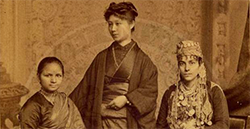International Women's History Month
Panel #1: Historical Women's Issues (including Opening Reception)
When: Tuesday 3/11/14, 6:30pm
Where: Liberal Arts Building Room 205
Panelists: Dr Jen Lynn, Mr Joseph Bryan, and Dr Ana Diaz
Panelist: Dr Jennifer Lynn, MSUB Assistant Professor of History: “Workers, Mothers and Citizens”: International Women’s Day
Topic: In 1910 female activists in Europe and the United States demanded that women, as “workers, mothers and citizens,” have the right to work, the right to vote and hold public office. Under the leadership of the German socialist-feminist, Clara Zetkin, “International Women’s Day” was officially established. Although interrupted by war, women continued to agitate for equality in politics and the economy. Throughout the twentieth-century, on March 8, women (and their supporters) have celebrated the political, social and economic achievements of women. Since 1975, the UN sponsors International Women’s Day and supports global programs to advance gender equality. While International Women’s Day was celebrated throughout the twentieth century, activists in the United States during the late 1970s began creating programs which honored women in history. During the 1980s, “Women’s History Week” was expanded to “Women’s History Month” in the United States in order to promote gender equality and recognize the importance of female contributions to all areas of society. This recognition was made possible by scholars who made visible the actions and voices of women in history.
Bio: Jen Lynn received her PhD in history from the University of North Carolina Chapel Hill in 2012. She is currently an Assistant Professor in the Department of History at MSUB and teaches courses on European history, European Women’s History, War and Film and the History of Monsters in European History. Her interest in photography and media closely informs her teaching and research related to Modern Germany, Women’s and Gender History and Visual/Cultural History. Her current project, “Contested Femininities: Gendered Representations of Modern Women in the German Illustrated Press, 1920 – 1960” explores how the ability to manipulate, modify, adopt the image of the Modern Woman to differing political and social goals is of central importance in understanding how different groups imagined, constructed and disseminated their ideal forms of “femininity” and “modernity” to a mass audience. Jen Lynn is an alumni of Montana State University Billings where she completed her BA in history in 2005.

The Deans Reception 1885:
The first female doctors from India, Japan and Syria, as students at the Women's
Medical College of Pennsylvania in 1885. (Photo: Legacy Center Archives, Drexel University
College of Medicine)
Panelist: Mr Joseph Bryan, MSUB History Instructor: "Women's Bodies and the Limits to Enlightenment"
Topic: My presentation will focus on eighteenth-century France and two aspects of Enlightenment understandings of women’s bodies. First, I will argue that alongside the economic growth of commerce and luxury goods grew an understanding of women’s bodies as particularly susceptible to the glitter of trinkets and changes in fashion. Second, I will demonstrate that eighteenth-century physiological views of women’s bodies highlighted their inherently perceptive senses, while reducing their ability to think abstractly due precisely to their overactive senses. For women, the legacy of the eighteenth century was ambiguous; some writers argued simultaneously for their sexual and social emancipation but confined them to a limited physiological or corporal organization.
Bio: Joseph Bryan is a part-time instructor at MSU Billings in the History Department and a Ph.D. candidate in Early-Modern French History at the University of North Carolina, Chapel Hill. Mr. Bryan’s work focuses generally on eighteenth-century France and the Enlightenment. Specifically, he is interested in the relationship of new conceptions of society to medical understandings of the body. His research focuses on how theories of the body both reflected and shaped eighteenth-century understandings of luxury, commerce, and the social order.
Panelist: Dr Ana Diaz, MSUB Assistant Professor of Philosophy: "The Cages Within"
Topic: Historically, feminists have argued that women’s liberation lies in the removal of social and legal barriers. To this end, philosophers like Mill have claimed that women’s liberation lies in education and upending the laws that hinder women’s advancement. While these steps are surely necessary, the more insidious aspects of women’s oppression lie in the myths that abound about the female essence. From Rousseau to today, there are various forms of thinking about women that keep them oppressed.
Bio: Ana Diaz is professor of philosophy at MSUB and has been with the English, Philosophy, and Modern Languages Department for the last four years. She recently completed her dissertation at Johns Hopkins University and became a tenure track faculty member. Her area of expertise is philosophy of mind, but has wider interests in the area of ethics, feminism, and political theory.

